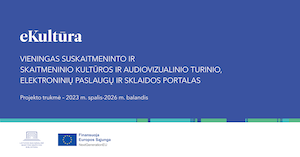From 1907–1939 the members of the Lithuanian Science Society (Lith. Lietuvių mokslo draugija – LMD) gathered previously documented manuscript folklore collections, collected folklore themselves, and encouraged others to do the same. The inherited collections were numbered and entered into an inventory book, however it is obvious that a portion of the collections were not described. Others were borrowed and never returned to the archive, and thus remained in private collections. Up until the present day, the Lithuanian Folklore Archives have preserved the majority of this collection, comprising 1,269 folklore compilations (over 50,000 pages, 82,000 folklore items) that were recorded in the 19th–first part of the 20th centuries. The collection was digitized in 2010–2012 in accordance with the Lithuanian Science Council funded project “Lithuanian Folklore Archives: digitization and dissemination of collections”, and made accessible in the Lithuanian Folklore Archives database.
In 2013, The Collections of the Lithuanian Science Society (19th–mid 20th c.) that are kept at the Institute of Lithuanian Literature and Folklore and Vilnius University Library were included in the UNESCO “Memory of the World” national register as objects of documentary heritage of national significance (registration No. 55).
The Lithuanian Science Society’s collection comprises three funds — LMD I, LMD II, and LMD III. The digitized registration book of these funds can be found in the section of inventory documents.
LMD I fund is the largest and contains 996 compilations of folklore documented from 1800–1932 throughout Lithuania. The collection’s signature is LMD I 1–1068 (around 100 items of this collection disappeared when transferring the archive from one place to another). Housed there are folklore collections of renowned Lithuanian writers and public figures - Jonas Basanavičius, Simonas Daukantas, Mečislovas Davainis-Silvestraitis, Žemaitė, Gabrielė Petkevičaitė-Bitė, Juozas Tumas-Vaižgantas, Laurynas Ivinskis, Matas Slančiauskas, Jurgis Elisonas, and others. Some of the LMD collections contain original, hand-written documents of the folklore collector, however a part of the collections are duplicates, such as Simonas Stanevičius’s song collection that was re-transcribed by Simonas Daukantas. Also kept here are the collections transcribed by the students of Vytautas Magnus high school. These transcriptions were made during the years that Vilnius was occupied by Poland, and were sent to the Lithuanian institutions that had been relocated to Kaunas; after World War II, they returned to Vilnius.
| Fondas: | LMD I |
| Signature: | LMD I 469 |
| Kolekcija: | Lietuvių mokslo draugijos (1907–1939) tautosakos rinkiniai |
| Document title : | Kunigo Pauliaus Tautkevičiaus (Pawel Tawtkiewicz) tautosakos rinkinys |
| Sudarymo metai: | 1818 |
| Fiziniai parametrai ir būklė: | Rinkinys patenkinamos būklės. Rašyta juodu rašalu, lenkiškai. Rašalas pablukęs. Rinkinį sudaro vienas lapas, buvęs perlenktas į keturias dalis. Rinkinio parametrai 20,5x35 cm. |
| Pastabos: |
Pirmame rankraščio puslapyje yra dr. Jono Basanavičiaus antspaudas ir jo kontekstinis komentaras, kodėl kunigai rinko burtus, prietarus, tikėjimus. Komentare rašoma, kad Seinų vyskupas sofraganas Augustinas Polikapas Marciejevskis, remiantis konsistorijos įsaku, įsako kunigams rinkti ir pranešti apie įvairius burtus ir nusidėjimus.
Tituliniame puslapyje nurodyta neteisinga pavardė – Jawtkiewiczius. Turi būti Paulius Tautkevičius (Pawel Tawtkiewicz). Žr. https://vistytis.lt/baznycios-istorija/ |
| Dokumentų rūšys: |
1. rankraščiai |
| Apimtis (kiekis): | 1. puslapiai: 3 |
| Kalbos: | 1. lenkų |
| Anotacija: | Rinkinį sudaro 5 tikėjimai ir 3 pasakojimai. |
| Bendras turinio vienetų kiekis: | 8 |
| Duomenų klasifikacija (žanrinis skirstymas): |
1. TIKĖJIMAI (1–5) 2. PASAKOJIMAI (6–8) |
| Užrašymo metai: | 1818 |
| Užrašytojas: | Pawel Jawtkiewicz |
| Užrašymo vieta: |
Vištytis sen., , Vilkaviškio r. sav., Marijampolės apskr. (originale: u Wisztyncu ) |
| Kitų žmonių įnašai: | 1. Kostas Aleksynas - inventorino 2. Andželika Jakubynienė - inventorino (2025 m. nustatė rankraščio užrašytojo tapatybę.) |
| Tekstas: | Tekstą perrašė LLTI Senosios literatūros skyriaus jaunesnysis mokslo darbuotojas Kęstutis Gudmantas 2025 m.
(K. Gudmanto komentaras: „Perrašo principai: išsaugota originalo rašyba ir skyryba, virš eilutės iškeltos raidės ir žodžiai kursyvinami, santrumpos neišskleidžiamos“.) Proboszcz Wisztyniecki Do Wielmożnego JMci Xiędza – Dziekana Wierżbołowskiego – Stosownie do Reskryptu prześ: Konsystorza Jeneralnego Diecezyi Wigierskiey daty 9 Stycznia r. b. przesyłam Rapport w Osnowie następującey = 1o w Parafii Wisztynieckiey, są przesądy zadawnione zwłaszcza u Mieszczan: a Wyiazd dokądkolwiek przecięwzięty w Poniedziałek ma być dla nich pełen nieszczęść = także i wszelka praca w tym dniu zaczęta – b. Od nowego roku do 3ch Królow, prząśc, mleć, lub jakimkolwiek rzemiosłem drudnić śię, niegodzi śię – c. We Czwartek urodzone Dziecko chrzci chrzśćić w Niedzieli niedobrze – d. Od Xiędza co ukraść, lub go oszu- kać, niejest grzechem – e. Po zmarłym Rodzice, Bracia, Sio= stry i wszyscy Krewni, choćby niechćieli powinni płakać, i pożegnanie czynić Trup Jego całując – || 2o Występki i wykroczenia są naypospo- litsze Piianstwa, tak u Włośćian jak też u Mieszczan – 3o Niezachowanie postow upowsze= chniło śię, tak u Szlachty, jako też u tych wszystkich, którzy się ubrali w Fraki, lub w krotkie Surduty z Kiszonkami po bo= kach – Ci Sami dalekiemi są od SS: Sakramentow – Jakie zaś Ich są mniemania i twierdzenia przećiwne Duchowi Swiętey Religii naszey, nietra= filo mi śię słyszeć – Takowy Rapport Wmu JXiędzu Dziekanowi przesyłając, własną ręką podpisałem – w Wisztyncu Dnia 7 Lutego 1818 r – X. Paweł Tawtkiewicz Tekstą 2025 m. išvertė Senosios literatūros skyriaus vadovė dr. Asta Vaškelienė Vyštyčio klebonas Dauggaliui Jo Mylistai Kunigui Vežbolovsko dekanui Remdamasis Vygrių generalinės diecezijos konsistoriaus raštišku š. m. sausio 9 d. atsakymu, siunčiu tokio turinio ataskaitą = 1o Vištyčio parapijoje yra nuo seno gyvuojantys prietarai, ypač tarp miestiečių: a kelionė, nesvarbu kur, į kurią vykstama pirmadienį, jiems bus kupina nelaimių = taip pat bet koks tą dieną pradėtas darbas nesiseks – b. nuo Naujųjų metų iki Trijų Karalių negalima verpti, malti arba kokiu kitu amatu užsiimti, [darbas] nesiseks – c. Ketvirtadienį gimusį vaiką krikštyti sekmadienį nėra gerai – d. iš Kunigo ką nors pavogti arba jam akis dumti, nėra nuodėmė – e. Mirus Gimdytojui, Broliai, Ses[erys], dėdės ir visi giminės, net ir nenorintys, turi verkti ir su [velioniu] atsisveikindami Jo kūną bučiuoti – || 2o Svarbiausia nuodėmė ir prasižengimas tiek tarp kaimiečių, tiek ir tarp miestiečių yra girtuoklystė – 3o Pasninko nesilaikymas paplito tiek tarp bajorų, tiek ir tarp visų kitų, kurie frakais ar trumpais surdutais su kišenėmis šonuose puošiasi – jie patys yra toli nuo Švč. Sakramentų – Tačiau man nepavyko išgirsti, ar jų nuomonės ir požiūriai prieštarauja mūsų Šventosios Religijos Dvasiai – Tokią ataskaitą, Kunige Dekane, Jums siunčiu pasirašytą Savo ranka – Vištytyje 1818 m. vasario 7 d. Kun. Paweł Tawtkiewicz |
← Back to list





